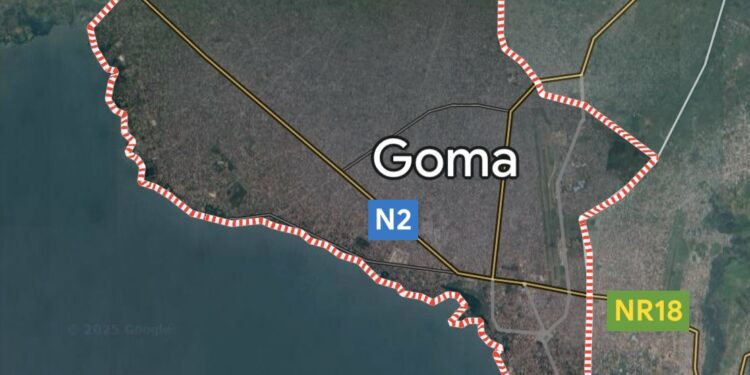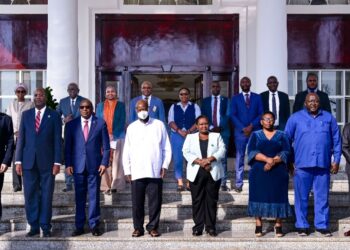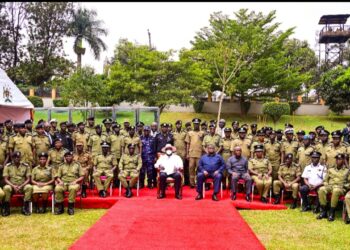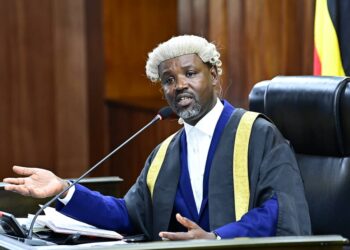GOMA, DRC: As the M23 rebel group, heavily backed by the Rwandan Armed Forces (RDF), continues its advance toward Goma, the capital of North Kivu province in the Democratic Republic of the Congo (DRC), the international condemnation of Rwanda’s role in the conflict has reached a fever pitch.
The escalating violence threatens to trigger a catastrophic humanitarian crisis, with the city teetering on the brink of collapse under the pressure of intensified fighting, displacement, and infrastructural sabotage.
The United States and France, citing concerns over the deteriorating security situation, have issued urgent advisories for their citizens to leave Goma as rebel forces edge closer to capturing the city. This move exposes the severity of the crisis and the potential for further destabilization in eastern Congo.
Rwanda’s support for M23 has drawn sharp criticism from the international community, with the European Union (EU), United Nations, and global human rights organizations condemning its actions. A recent UN report has provided concrete evidence of Rwanda’s backing of the rebel group, accusing Kigali of supplying arms, logistical support, and military reinforcements to M23, enabling their rapid territorial gains in North Kivu.
The EU’s High Representative for Foreign Affairs has stated , “Rwanda’s actions constitute a direct threat to regional stability and a gross violation of international norms.”
UN agencies warn of devastating consequences for civilians, with the UN Secretary-General António Guterres stating that the renewed offensive poses a “devastating toll on civilians” and increases the risk of a “regional war.”
He urged the M23 to “immediately cease its offensive, withdraw from all occupied areas, and abide by the 31 July 2024 ceasefire agreement.”
Ravina Shamdasani, spokesperson for the UN human rights office, OHCHR, warned that “any such attack on Goma risks catastrophic impacts on hundreds of thousands of civilians,” further highlighting that “sexual violence is a key component – a very horrific component – of this conflict.”
Speaking on the challenges faced by aid workers, UNHCR spokesperson Matt Saltmarsh said, “What you will receive in terms of aid is extremely limited… If [agencies] are able to access those sites, we can bring in a minimum of assistance; otherwise, civilians will be in areas that are now occupied by armed groups.”
Meanwhile, the US Senate Foreign Relations Committee Chair, Senator Jim Risch, lambasted the Biden administration for failing to take decisive measures against Rwanda..
“The M23 must immediately stop their advance on Goma, and all parties must cease hostilities, restore unhindered humanitarian access, and honor their commitments under the Luanda process. The Biden administration’s failure to hold parties accountable for past violations has emboldened actors behind this current round of fighting. The conflict in Eastern Congo has displaced millions, caused widespread atrocities—particularly against women and children—and destabilized a region critical to regional and U.S. economic security. The Congolese people deserve better, and all sides of this conflict must act swiftly to end this fighting.” Quoted his statement
Human Rights Watch corroborated these claims, documenting atrocities committed by M23, including the recruitment of child soldiers, forced labor, and targeted attacks on civilian camps.
“Rwandan support has emboldened M23 to act with impunity, wreaking havoc on civilian populations,” said Clémentine de Montjoye, senior Africa researcher at the organization.
Humanitarian Crisis in Goma
As M23 consolidates its hold on key strategic areas near Goma, the city’s residents are grappling with unprecedented challenges.
The rebels have deliberately sabotaged power lines, plunging Goma into darkness and crippling essential services such as hospitals and water treatment plants. This deliberate targeting of infrastructure has heightened fears of a complete breakdown in the city’s capacity to support its population.
With supply routes cut off and key towns such as Minova and Sake under rebel control, Goma’s 1-2 million residents face severe shortages of food, water, and medical supplies. Displacement camps around the city, already overflowing with over 800,000 internally displaced persons (IDPs), are on the verge of collapse.
The UN Refugee Agency (UNHCR) has reported shelling of these camps, leading to civilian casualties and destruction of critical shelters. Hospitals in Goma are overwhelmed, with injured women and children forming a significant proportion of the casualties.
Amid this escalating violence, the United States and France have issued emergency advisories to their citizens in Goma, urging them to evacuate immediately. This rare move highlights the gravity of the crisis and the increasing likelihood of M23 capturing the city.
The US State Department has warned of the deteriorating security situation and the risks of remaining in the city as fighting intensifies. The French government echoed these concerns, emphasizing that the rebel group’s advance poses a direct threat to civilians, including foreign nationals.
This development has further eroded confidence in Goma’s safety, with other foreign missions expected to follow suit. Aid agencies have also begun relocating non-essential staff, leaving vulnerable populations with even fewer lifelines.
The fall of Goma would mark a significant victory for M23 and its Rwandan backers, undermining Congolese sovereignty and emboldening other armed groups in the region. North Kivu authorities have already banned boat travel on Lake Kivu, fearing further disruption to transport routes.
Experts warn that the humanitarian consequences of losing Goma to rebel control would be devastating. The city serves as a critical hub for aid distribution and logistics in eastern Congo. Its capture would not only worsen the crisis for residents but also disrupt international relief efforts aimed at supporting millions of displaced individuals across the region.
The international community has called for urgent measures to address the crisis, with the EU reaffirming its support for the African Union-led peace efforts under the Luanda and Nairobi frameworks. However, Rwanda’s continued interference has jeopardized these initiatives, leaving the DRC’s government with limited options to counter M23’s advances.
The fall of Goma would represent a major victory for M23 and its Rwandan backers, undermining Congolese sovereignty and potentially plunging the region into greater instability. Goma serves as a critical hub for humanitarian aid in eastern Congo, and its capture would severely disrupt relief efforts.
The deliberate sabotage of power and water infrastructure, coupled with the evacuation of foreign nationals, points to a calculated strategy by M23 to destabilize the city and assert control. This has already created a ripple effect, with neighboring countries bracing for an influx of refugees and renewed violence spilling across borders.
Regional analysts warn that Rwanda’s continued involvement threatens to derail peace efforts under the Nairobi and Luanda frameworks.
“Rwanda’s actions are not just destabilizing the DRC; they’re destabilizing the entire Great Lakes region,” said a security expert at the African Union.
On Thursday night, Maj Gen Peter Cirimwami, North Kivu’s Governor, was shot by M23 fighters while on frontline on Thursday.
He was airlifted to the capital Kinshasa for possible treatment abroad, but “succumbed to his injuries”, said army spokesperson Gen Sylvain Ekenge.
Do you have a story in your community or an opinion to share with us: Email us at editorial@watchdoguganda.com













